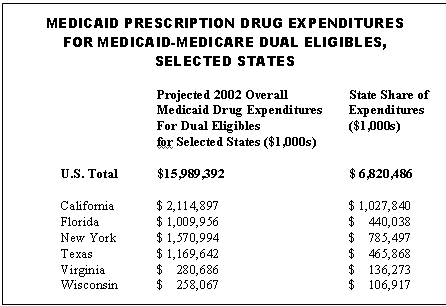New York City, April 8, 2003—A new report from The Commonwealth Fund reveals that enactment of a Medicare drug benefit could save states up to $6.8 billion annually, and could even help many states avoid cuts in Medicaid services. Medicaid prescription drug coverage for approximately 6 million "dual eligibles"—low-income seniors and persons with disabilities who are covered by both Medicaid and Medicare—accounts for nearly half of all Medicaid spending on prescription drugs, including both federal and state shares of Medicaid prescription costs. Varying portions of these costs would be picked up by Medicare under current proposals in Congress. Seniors with low incomes could also gain improved access to prescription drugs, with a more uniform basic benefit set by Medicare.
"A Medicare prescription drug benefit would improve access for needed drugs to the most vulnerable seniors—those with low incomes, many of whom are forced to forgo needed medications because they can't afford them," said Karen Davis, president of The Commonwealth Fund. "As an added benefit, states would get desperately needed budget relief for Medicaid drug expenditures."
 In the report, State Medicaid Prescription Drug Expenditures for Medicare-Medicaid Dual Eligibles, Stacy Berg Dale and James M. Verdier, both of Mathematica Policy Research, Inc., estimate that Medicaid spent $16 billion on prescription drug coverage in 2002 for the 6 million low-income Medicare beneficiaries who also are enrolled in Medicaid. This comes to more than $2,800 per year per beneficiary—ranging from just under $2,000 a year per enrollee in New Mexico to nearly $4,000 a year per enrollee in Connecticut. Current proposals in Congress to cover prescription drugs under Medicare could provide major fiscal relief to state Medicaid programs. The amount of relief would depend in large measure on how much responsibility remains with states for covering cost-sharing for low-income Medicare beneficiaries, including premiums, deductibles, coinsurance, copays, and gaps or "holes" in the drug benefit.
"Completely covering prescription drugs under Medicare would improve access to drug coverage for dual eligibles and facilitate coordination of their acute care services—hospital, physician, prescription drugs, lab and x-ray—since only one payer would be responsible for these services," said James Verdier, senior fellow at Mathematica and co-author of the report.
Medicare prescription drug coverage for dual eligibles could make basic coverage more uniform, increasing access to coverage and smoothing state variations. The savings to Medicaid could be used to avert benefit and eligibility cutbacks as states grapple with current budget shortfalls. Each $1 billion savings could help keep 1 million low-income adults under age 65, or more than 1.5 million children on Medicaid or CHIP rolls.
In the report, State Medicaid Prescription Drug Expenditures for Medicare-Medicaid Dual Eligibles, Stacy Berg Dale and James M. Verdier, both of Mathematica Policy Research, Inc., estimate that Medicaid spent $16 billion on prescription drug coverage in 2002 for the 6 million low-income Medicare beneficiaries who also are enrolled in Medicaid. This comes to more than $2,800 per year per beneficiary—ranging from just under $2,000 a year per enrollee in New Mexico to nearly $4,000 a year per enrollee in Connecticut. Current proposals in Congress to cover prescription drugs under Medicare could provide major fiscal relief to state Medicaid programs. The amount of relief would depend in large measure on how much responsibility remains with states for covering cost-sharing for low-income Medicare beneficiaries, including premiums, deductibles, coinsurance, copays, and gaps or "holes" in the drug benefit.
"Completely covering prescription drugs under Medicare would improve access to drug coverage for dual eligibles and facilitate coordination of their acute care services—hospital, physician, prescription drugs, lab and x-ray—since only one payer would be responsible for these services," said James Verdier, senior fellow at Mathematica and co-author of the report.
Medicare prescription drug coverage for dual eligibles could make basic coverage more uniform, increasing access to coverage and smoothing state variations. The savings to Medicaid could be used to avert benefit and eligibility cutbacks as states grapple with current budget shortfalls. Each $1 billion savings could help keep 1 million low-income adults under age 65, or more than 1.5 million children on Medicaid or CHIP rolls.


